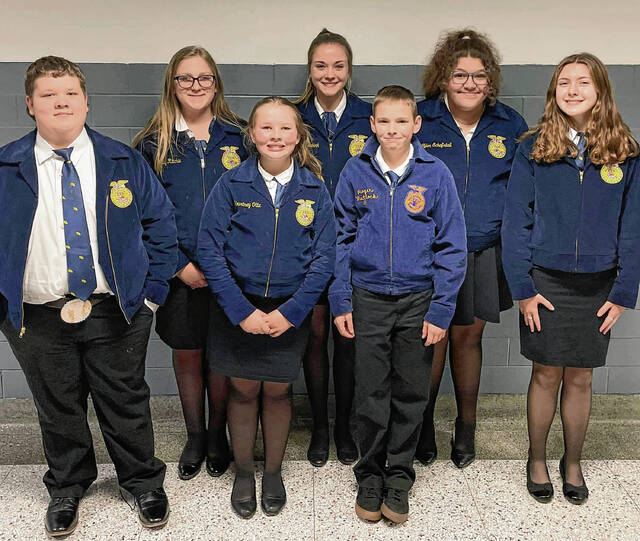
The Seymour FFA novice parliamentary procedure team won the section contest Jan. 21 at Madison High School. From left are Gavin Wessel, Reann Hons, Emmy Otte, Audrey Newkirk, Jayden Matlock, Addie Kinworthy and Aubri Engle.
Submitted photo
First place at the district contest at Brownstown Central High School.
First place at the section contest at Madison High School.
Next up for the Seymour FFA novice parliamentary procedure team is the state contest Feb. 12 at Lebanon High School.
The seven-member team is shooting for a sweep as it prepares to compete against seven other teams of seventh-, eighth- and ninth-graders from around the state.
In 2019, a team of 12 girls qualified for the chapter state contest (grades 10 to 12) for the first time in Seymour High School history. This year, it’s the first time a Seymour novice team has qualified for state.
Adviser Jeanna Eppley found out the results of the section contest via email the next day.
“They were all pretty excited,” she said. “They’ve put in a lot of hours practicing this. This team, they really want to win. They have the desire. They are putting in the hard work. They are determined.”
Only two of the team members — freshmen Audrey Newkirk and Aubri Engle — had experience with parliamentary procedure before this school year.
Newcomers are eighth-graders Gavin Wessel, Reann Hons, Jayden Matlock and Addie Kinworthy and seventh-grader Emmy Otte.
“The first few practices, there were some that were a little shy, and so many of these students have broken out of their shell just with this contest and the couple of months we’ve been practicing,” Eppley said. “I think they actually hold themselves up to the highest expectations. They have a lot of determination.”
Parliamentary procedure tests a team’s knowledge of how to conduct a formal business meeting using Robert’s Rules of Order as the parliamentary authority. For the FFA contest, the team also performs opening and closing ceremonies, and each member has a role, including president, vice president, secretary, treasurer, reporter, sentinel and advisor.
Each member is given a card with instructions when they enter a room. They’re given a minute to review it but are not allowed to discuss it before the meeting begins.
The president and other members have to know how to properly present the motions and when it is appropriate in order to take such actions. The judges also will attempt to make a motion out of order or present a challenging motion to test the team’s knowledge, and the president has to know whether it’s proper and address it or ask the judge to restate the motion properly.
The team always gets a main motion and a list of privileged, incidental and subsidiary motions that must be completed during the contest. These include actions such as amending the main motion, postponing a motion to another meeting and how to pause a meeting by taking a proper recess.
New this year, the team must answer impromptu oral questions that the judge asks on the spot. At state, three team members will be called on to answer individual questions, and then the team will have three they can discuss and answer together. These questions are to prove the team’s knowledge of Robert’s Rules of Order in-depth and also challenge their leadership ability to stand and deliver an oral response.
“It’s very applicable when they are members of a board of directors or even boards through church or the Community Foundation, those kinds of things,” Eppley said.
Newkirk, who serves as president for the team, said she’s proud of the team for winning the district and section contests.
“When we walk into the room, our nerves are high, but as soon as I tap that gavel and I call to order the meeting, I feel as though we all just get back into what we know and all of our nerves diminish,” she said. “That’s what I love so much about this.”
Engle agreed.
“I would say our nerves were definitely high and we were all kind of freaked out, but we put a lot of work into this and made sure that we worked hard, and I think that both times, we should have been very proud of ourselves because we did do very well,” she said.
Hons said since everyone on the team has become friends, they have become closer and comfortable about doing parliamentary procedure.
While she said there will be a lot of pressure at state because it’s the first Seymour novice team to make it to that level, she’s excited for the opportunity.
The other newcomers are ready for state.
“I’m looking forward to growing closer and working to get better because we can only go up,” Wessel said.
“I’m really excited because I don’t think we’ll be as nervous this time because the first few times, I feel like it was really nerve-racking when we went in there, and I don’t think it will be as bad this time,” Kinworthy said.
Matlock said the team has improved since the beginning.
“I remember everybody doing opening ceremonies, they could say a sentence and then have to look back down at their book, but now, we just know it right off the top of our heads, and we just get so much more confident and know what we’re doing,” he said.
As long as the team maintains the work it has put in during practices and carries that on to the competition, Newkirk said they will excel.
“We all bring things to this team that are vital for our success, and I know that all of them will carry on what they’ve learned into their life,” she said. “This will teach them leadership skills, and they have gained so much knowledge, not only about Robert’s Rules of Order but just how to work on a team and hold each other accountable for our mistakes.”
